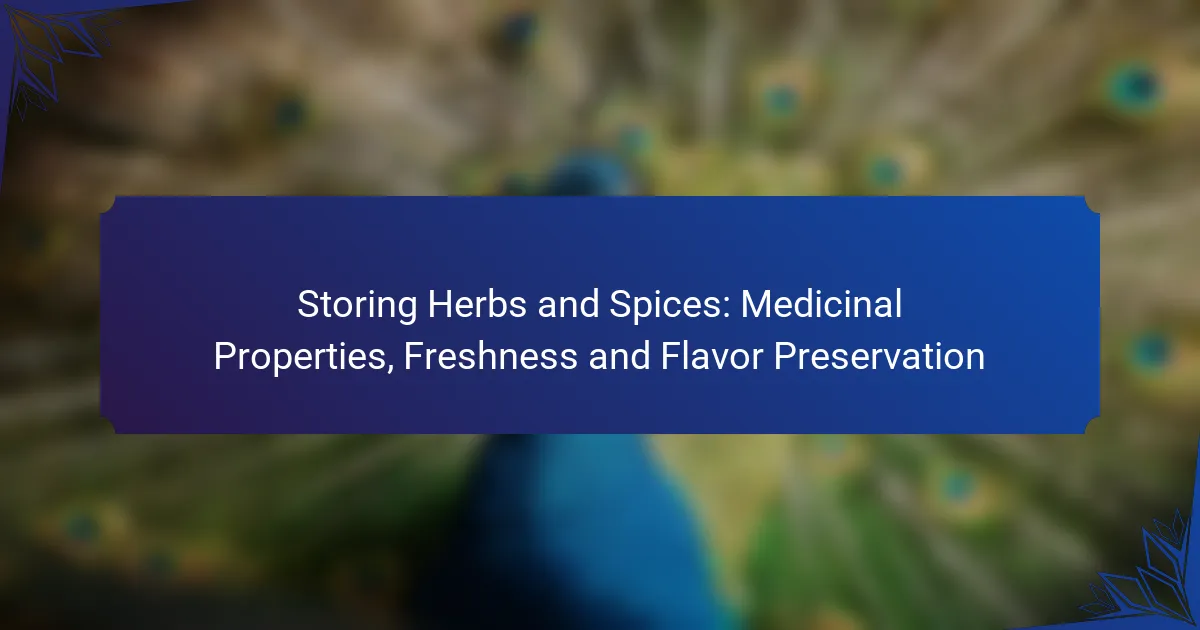Storing herbs and spices properly is essential for preserving their freshness, flavor, and medicinal properties. Utilizing airtight containers in cool, dark environments, along with techniques like vacuum sealing, can significantly extend their shelf life and effectiveness. By protecting these natural ingredients from air, light, and moisture, you can maintain their aromatic compounds and health benefits for longer periods.

How to store herbs and spices for maximum freshness?
To ensure herbs and spices maintain their freshness, flavor, and medicinal properties, store them in airtight containers, in cool, dark places, and consider vacuum sealing for long-term preservation. These methods help prevent exposure to air, light, and moisture, which can degrade quality over time.
Airtight containers
Airtight containers are essential for preserving the freshness of herbs and spices. Glass jars with tight-fitting lids, metal tins, or specialized spice containers can effectively keep out air and moisture. Avoid using plastic bags or containers that are not sealed properly, as they can allow air to enter and compromise the quality.
When choosing containers, opt for dark or opaque materials to block light, which can also degrade herbs and spices. Label your containers with the contents and the date of storage to keep track of freshness.
Cool, dark places
Storing herbs and spices in cool, dark places is crucial for maintaining their potency. Ideal locations include pantry shelves or cabinets away from heat sources like stoves and ovens. Temperature fluctuations can lead to moisture buildup, which negatively impacts flavor and medicinal properties.
Avoid storing spices above the stove or in direct sunlight, as these conditions can accelerate the loss of flavor. A consistent temperature, ideally below 25°C (77°F), helps preserve the integrity of your herbs and spices.
Vacuum sealing
Vacuum sealing is an effective method for extending the shelf life of herbs and spices. By removing air from the packaging, vacuum sealing minimizes oxidation and moisture exposure, which are key factors in spoilage. This method is particularly useful for bulk storage or long-term preservation.
When vacuum sealing, use high-quality bags designed for food storage to ensure a proper seal. Label the bags with the contents and date, and store them in a cool, dark place for optimal results. This technique can significantly prolong the freshness of your herbs and spices, keeping them flavorful for months or even years.

What are the medicinal properties of common herbs and spices?
Common herbs and spices possess various medicinal properties that can enhance health and well-being. These natural ingredients often contain bioactive compounds that provide benefits such as anti-inflammatory effects, blood sugar regulation, and antioxidant properties.
Turmeric benefits
Turmeric is renowned for its active compound, curcumin, which has strong anti-inflammatory and antioxidant properties. Regular consumption of turmeric may help reduce the risk of chronic diseases, including heart disease and cancer.
To incorporate turmeric into your diet, consider adding it to curries, smoothies, or teas. A common recommendation is to consume about 1-3 grams of turmeric powder daily for optimal benefits.
Ginger anti-inflammatory effects
Ginger contains gingerol, a compound known for its potent anti-inflammatory and antioxidant effects. It can help alleviate symptoms of osteoarthritis and reduce muscle pain after exercise.
For effective use, aim for 1-2 grams of fresh ginger daily, which can be consumed in teas, soups, or as a spice in various dishes. Be cautious, as excessive ginger intake may lead to digestive discomfort.
Cinnamon blood sugar regulation
Cinnamon has been shown to improve insulin sensitivity and lower blood sugar levels, making it beneficial for those with type 2 diabetes. Its bioactive compounds can help regulate glucose metabolism.
Incorporating about 1 teaspoon of cinnamon into your daily diet can be effective. You can add it to oatmeal, smoothies, or baked goods, but be mindful of the type of cinnamon used, as Cassia cinnamon contains higher levels of coumarin, which may be harmful in large amounts.

How does storage affect flavor preservation?
Storage significantly impacts the flavor preservation of herbs and spices by influencing their freshness and potency. Proper storage techniques can help maintain their aromatic compounds and medicinal properties, ensuring that they remain flavorful and effective for longer periods.
Impact of light exposure
Light exposure can degrade the quality of herbs and spices, leading to loss of flavor and potency. Ultraviolet (UV) light can break down essential oils and other compounds responsible for their aroma and taste. To minimize this effect, store herbs and spices in opaque containers or in dark cabinets away from direct sunlight.
Humidity control
Humidity plays a crucial role in the preservation of herbs and spices. Excess moisture can lead to mold growth and spoilage, while too little humidity can cause them to dry out and lose flavor. Aim to store herbs and spices in a cool, dry place, ideally with humidity levels below 60% to maintain their quality.
Temperature stability
Temperature stability is essential for preserving the flavor of herbs and spices. Fluctuating temperatures can cause condensation in containers, promoting spoilage. Ideally, store these items in a consistent, cool environment, away from heat sources like stoves or ovens, to keep them fresh and flavorful.

What are the best practices for drying herbs?
The best practices for drying herbs involve selecting the right method based on the type of herb and the desired flavor intensity. Proper drying techniques help preserve the medicinal properties and freshness of herbs, ensuring they maintain their flavor and aroma for longer periods.
Air drying methods
Air drying is a traditional and effective way to dry herbs, especially those with low moisture content like thyme and oregano. To air dry, bundle the herbs and hang them upside down in a warm, dry, and well-ventilated area, away from direct sunlight. This method typically takes a week or two, depending on humidity levels.
Ensure the herbs are completely dry before storing them to prevent mold growth. A good test is to check if the leaves crumble easily when rubbed between your fingers.
Oven drying techniques
Oven drying is a quicker method for drying herbs, suitable for those who need to preserve herbs in a short time. Preheat the oven to a low temperature, around 90-100°C (200-212°F), and spread the herbs in a single layer on a baking sheet. Keep the oven door slightly ajar to allow moisture to escape, and check the herbs every 30 minutes.
This method usually takes 1-2 hours, but be cautious not to overheat the herbs, as high temperatures can diminish their flavor and medicinal properties.
Dehydrator usage
Using a dehydrator is an efficient way to dry herbs while retaining their essential oils and flavors. Set the dehydrator to a temperature of 35-45°C (95-115°F) and arrange the herbs in a single layer on the trays. Dehydrating herbs typically takes 4-8 hours, depending on the type of herb and moisture content.
Regularly check the herbs for dryness, and store them in airtight containers once they are completely dry. This method is particularly useful for larger batches and can be more energy-efficient than using an oven.

How to choose the right containers for herbs and spices?
Selecting the right containers for herbs and spices is crucial for maintaining their freshness and flavor. Consider factors like material, size, and sealing capabilities to ensure optimal storage conditions.
Material types
The material of your containers significantly affects the preservation of herbs and spices. Glass is a popular choice due to its non-reactive nature and ability to keep out moisture and light. Metal containers can also be effective, but they should be coated to prevent rust and preserve flavor.
Plastic containers are lightweight and convenient, but they may absorb odors over time and can be less effective at blocking light. Choose BPA-free options to avoid chemical leaching. Ceramic containers are aesthetically pleasing and can provide good insulation, but ensure they are properly sealed to prevent air exposure.
Size considerations
When selecting container sizes, consider the quantity of herbs and spices you typically use. Smaller containers are ideal for frequently used spices, allowing for easy access and minimizing exposure to air. For bulk storage, larger containers can be economical but should be used with caution to avoid spoilage.
A good rule of thumb is to choose containers that hold enough for a few months of use, as this helps maintain freshness. If you buy in bulk, consider using smaller, airtight jars for daily use while keeping the bulk supply in a larger, sealed container to protect it from light and moisture.
